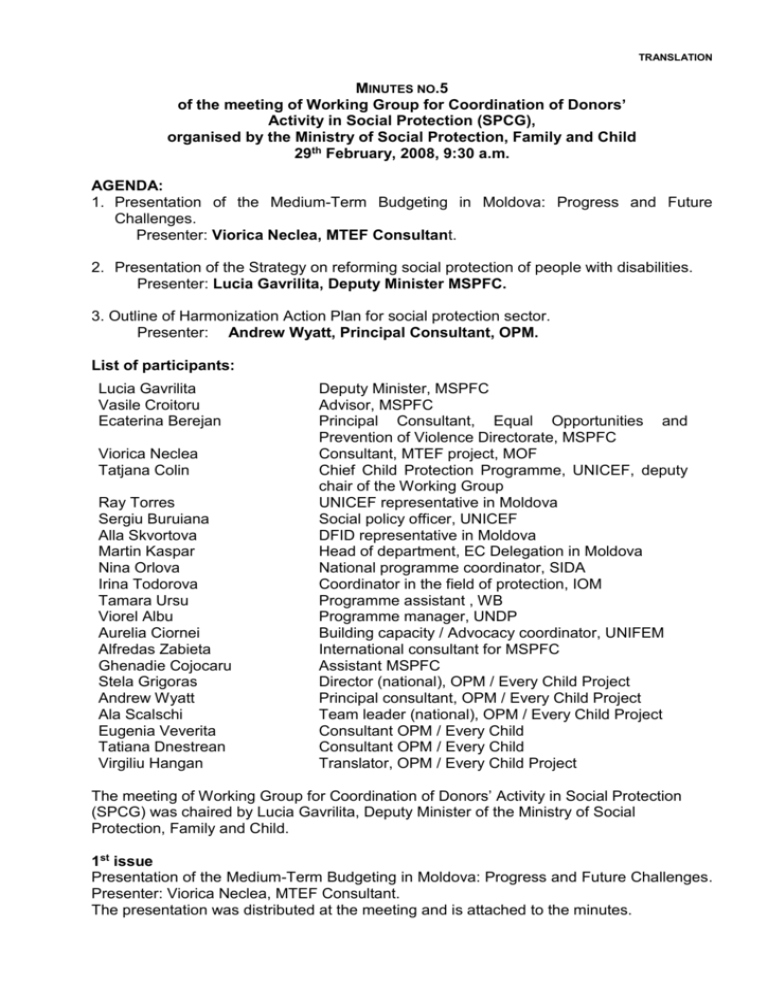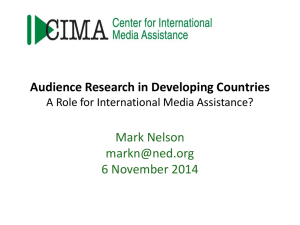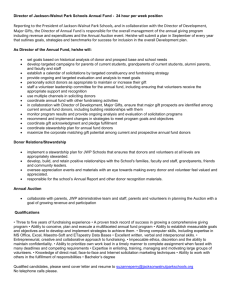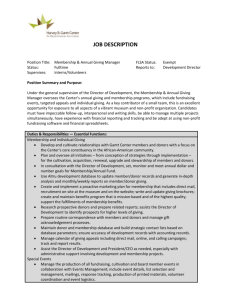MINUTES NO
advertisement

TRANSLATION MINUTES NO.5 of the meeting of Working Group for Coordination of Donors’ Activity in Social Protection (SPCG), organised by the Ministry of Social Protection, Family and Child 29th February, 2008, 9:30 a.m. AGENDA: 1. Presentation of the Medium-Term Budgeting in Moldova: Progress and Future Challenges. Presenter: Viorica Neclea, MTEF Consultant. 2. Presentation of the Strategy on reforming social protection of people with disabilities. Presenter: Lucia Gavrilita, Deputy Minister MSPFC. 3. Outline of Harmonization Action Plan for social protection sector. Presenter: Andrew Wyatt, Principal Consultant, OPM. List of participants: Lucia Gavrilita Vasile Croitoru Ecaterina Berejan Viorica Neclea Tatjana Colin Ray Torres Sergiu Buruiana Alla Skvortova Martin Kaspar Nina Orlova Irina Todorova Tamara Ursu Viorel Albu Aurelia Ciornei Alfredas Zabieta Ghenadie Cojocaru Stela Grigoras Andrew Wyatt Ala Scalschi Eugenia Veverita Tatiana Dnestrean Virgiliu Hangan Deputy Minister, MSPFC Advisor, MSPFC Principal Consultant, Equal Opportunities and Prevention of Violence Directorate, MSPFC Consultant, MTEF project, MOF Chief Child Protection Programme, UNICEF, deputy chair of the Working Group UNICEF representative in Moldova Social policy officer, UNICEF DFID representative in Moldova Head of department, EC Delegation in Moldova National programme coordinator, SIDA Coordinator in the field of protection, IOM Programme assistant , WB Programme manager, UNDP Building capacity / Advocacy coordinator, UNIFEM International consultant for MSPFC Assistant MSPFC Director (national), OPM / Every Child Project Principal consultant, OPM / Every Child Project Team leader (national), OPM / Every Child Project Consultant OPM / Every Child Consultant OPM / Every Child Translator, OPM / Every Child Project The meeting of Working Group for Coordination of Donors’ Activity in Social Protection (SPCG) was chaired by Lucia Gavrilita, Deputy Minister of the Ministry of Social Protection, Family and Child. 1st issue Presentation of the Medium-Term Budgeting in Moldova: Progress and Future Challenges. Presenter: Viorica Neclea, MTEF Consultant. The presentation was distributed at the meeting and is attached to the minutes. Viorica Neclea mentioned that it is the right moment to present the Medium Term Expenditure Framework (MTEF), because it is now being developed. The reform of budgetary planning was implemented in several stages, with the support of the WB, DFID beginning with year 2002. At this stage, ministries have the capacity to continue the process of MTEF development independently. MSPFC is experienced, because it has been involved in MTEF development since 2003. Strategic budget planning and reflection of policies in the budget were identified as the main problems of 1999-2000 that led to the need of reform in the budgetary system. MTEF is a medium term budget planning method, which allows progress evaluation and forecasting the necessary actions and resources. MTEF includes donor-funded investment projects administered by the Ministry of Finance. Grants are not included in the MTEF. It would be useful to have available information on the direction and planned actions of donor organisations. We will thus be able to have an overview on activities and resources, avoiding overlaps or activities without financial cover. The line ministry has a key role in developing policies. An appropriate approach for improving communication with donors would be the direct collaboration with the policy planning divisions. MTEF has influenced the policy development process through priority analysis and analytical improvement of policies. The budget planning process is now more transparent and participative. During the approval process policies are modified, after being developed by the Government. Sometimes this creates discrepancies between the prioritised activities and the financed activities. The improvement of the use of resources through savings, reallocation of resources between programmes and additional allocation of resources to priority activities are the tendencies of the budgetary process in the recent years. Discussion: M.Kaspar Asked for data on resources and actions for the Social Protection Sector planned for 2010-2011. E.Veverita Work is being carried out on budget planning for 2009-2011 and the calculations are being developed. M.Kaspar The task of this Working Group is not only to inform, but also to consider priorities in Social Protection field. It would be good to analyse and discuss the priority directions and the necessary actions for their implementation. E.Veverita Representatives of donor organizations could be included in the Working Group for MTEF development. L.Gavrilita MSPFC is open for collaboration by informing and involving donor representatives in the policy development process, including MTEF. R.Torres Donors have to support the Government in achieving the established objectives, especially taking into account the intention to promote: 1. efficient use of resources 2. clarity and targeting of activities based on priorities 3. inter-sector approach 4. linking policies with budgets. Informing donors is not just a formal action, but aims at supporting the process of policy development and thinking. If we succeed in coordinating our efforts, even outside the MTEF process, it would be great. Because after budget and MTEF development it is necessary to evaluate and monitor the actions, where we need to concentrate our attention. We receive isolated requests of funds for technical assistance from the Government. This dissolves the priority. During the presentation, it was mentioned that the intention is to reduce public expenditure, which means improvement of the use of resources rather than reducing the costs. Especially in social protection, as in education, we cannot just reduce resources, we have to ensure that existing resources are used more efficiently and are targeted based on the needs. It was also mentioned that technical assistance will save some resources in the budget. The Government establishes some objectives and needs support to achieve them and not leave them in donors’ responsibility. So, we are not speaking about savings based on donors’ resources, but about the unification of our efforts to achieve the established objectives. V.Neclea I meant savings at the level of public expenditure reduction in relation to GDP, but we have to look at every sector independently /individually, and savings depend on the sector. The reallocation and efficient use of resources are supported. M.Kaspar The need to support community social assistants and the salary problem were mentioned by the Minister at the previous Working Group meeting. This subject is more related to the MTEF. We can help with establishing communication with the Ministry of Finance so that it finds modalities to reallocate resources with a view to increase social assistants’ salaries. In this case, our intervention is through cooperation between ministries and sectors. V.Neclea Donors participate in NDP development through evaluation and proposals. There is a Participative Council of the NDS where donors are consulted. MTEF process does not have a similar donors’ group. But donors can have access to the information and development process from the Ministry of Finance. In addition, donor representatives can be involved at sector level at the Ministries’ discretion. L.Gavrilita We are interested in direct collaboration and will find a way to use donors’ experience and knowledge. 2nd issue Presentation of the draft Strategy on reforming social protection of people with disabilities. Presenter: Lucia Gavrilita, Deputy Minister MSPFC. Mrs Gavrilita had intended to present the draft Strategy on reforming social protection of people with disabilities before it was released to civil society in the following week. However, the presentation was postponed for the next SPCG meeting because issue no.1 and the discussions that followed took more time than was planned. Meanwhile, the participation process will start on 6th of March, when the strategy will be presented to civil society and posted on the ministry’s webpage. The strategy text can be accessed and commented. 3rd issue Outline of the draft Harmonization Action Plan (HAP) for social protection sector. Presenter: Andrew Wyatt, Principal Consultant, OPM. Andrew Wyatt presented the key points for the Harmonization Action Plan for social protection sector. The presentation text was circulated before the meeting and is attached to the minutes. The main objective of the Action Plan is to improve efforts at coordination and consistency in social protection, help donors align to government processes and priorities, and support their involvement in a sector-wide approach to implementation of social protection. The key points the Harmonization Action Plan should contain are: Consensus on policies and strategies, Government-donor dialogue, development of a programming document for common achievement of objectives, engagement with governmental financial management and accountability systems, commitments to provide donor assistance solely through agreed procedures and programmes, donor–donor working mechanism (WG), monitoring through established indicators, and a public consultation and accountability mechanism. At the practical level: The results of mapping exercises can be placed on the ministry’s webpage, if this is approved by the members of the group. Donors who hadn’t yet sent information or amendments for the mapping exercise were encouraged to so soon. The proposal to set up a Newsletter for Social Protection Coordination Group was solved by the possibility of placing information on donor harmonisation in the existing monthly MSPFC newsletter. All pieces of news on SPCG and other important information and announcements from donor organisations can be published in the existing newsletter, which is also published on the ministry’s webpage. Interested donors can send their information and pieces of news to be published in the 4th issue of the newsletter, by 19th March to the SPCG secretariat. Discussions: N.Orlov 29th February is the deadline for sending information on DAC questionnaire to be included by the Ministry of Finance in the national classifier. At the moment, gender equality issues are missing. Donor organisations that have projects in this sector are asked to send their contribution. M.Kaspar At what stage is the National Development Strategy and is it possible to receive information on priorities? L.Gavrilita The NDS is to be approved in 2 weeks. R.Torres It would be good to have the information consolidated and published on the Governmental website. We support information exchange. Donor organisations have reported the implementation of Paris Declaration; it would be helpful to use the same format for collecting information. Item point 4 of the presentation – how to work with the government. We could improve communication by simplifying the existing procedures (stamps and rigid format). The same communication style persists in the Government–donor relationship. It is necessary to have more flexibility in the ministries, to involve consultants in the policy development process. L.Gavrilita We are stuck in a very rigid frame, and although we are trying to change the situation, it is hard. For example the opening of a centre for trafficking –we had the intention to promote a new approach to service delivery, relation with beneficiaries, working and communication modality but it was difficult. We also need more flexibility at the level of funding. I speak particularly about the resource reallocation mechanism, which is very important in the deinstitutionalisation process We have to redirect resources to social services, consolidate the social assistant network, and prevent. N.Orlova The efficient use of resources can be addressed through the Institutional Development Plan. This can be the entry point for the efficient use of existing resources, their reallocation, including MTEF and development of a new mechanism of work with donors. A. Wyatt Alfredas Zabieta is a consultant employed by MSPFC and is helping the ministry in developing such a Plan. Next SPCG meeting The date for the next meeting was agreed by the working group members, for 25th March because this coincides with DFID mission. Meanwhile the date will be confirmed. Chair of the Coordination Group, Minister of Social Protection, Family and Child Minutes taken by Tatiana Dnestrean Galina Balmos







